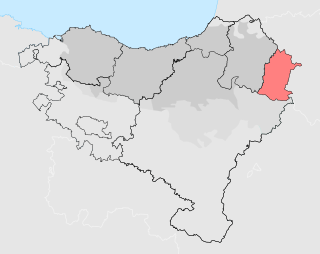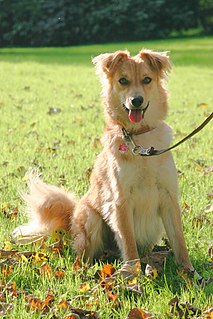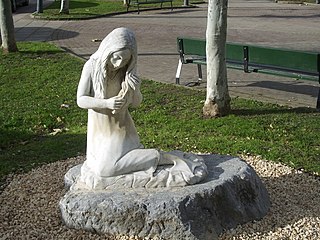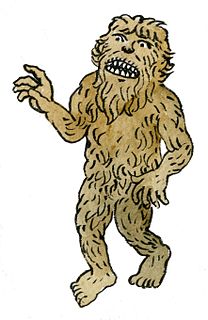
Basque (; euskara[eus̺ˈkaɾa]) is a language spoken in the Basque Country, a region that straddles the westernmost Pyrenees in adjacent parts of northern Spain and southwestern France. Linguistically, Basque is unrelated to the other languages of Europe and is a language isolate to any other known living language. The Basques are indigenous to, and primarily inhabit, the Basque Country. The Basque language is spoken by 28.4% (751,500) of Basques in all territories. Of these, 93.2% (700,300) are in the Spanish area of the Basque Country and the remaining 6.8% (51,200) are in the French portion.
The Basques are an indigenous ethnic group characterised by the Basque language, a common culture and shared genetic ancestry to the ancient Vascones and Aquitanians. Basques are indigenous to and primarily inhabit an area traditionally known as the Basque Country, a region that is located around the western end of the Pyrenees on the coast of the Bay of Biscay and straddles parts of north-central Spain and south-western France.

Night or nighttime is the period from sunset to sunrise in each twenty-four hours, when the Sun is below the horizon. However it can be defined differently and is subjective. Night can be defined as the time between bedtime and morning. There is no exact time for when night begins and ends. The start of night begins when evening ends, which is subjective, but is typically believed to end at astronomical sunset, which is when night may begin. There can be no precise definition in terms of clock time, but it is usually considered to start around 9 pm and to last to about 5 am. Since sunset and sunrise vary throughout the year there can be no precise definition in terms of clock time. Night and morning overlap when one considers morning to start past 12 am, which can be described as 'morning-night duality'.

Olentzero is a character in Basque Christmas tradition. According to Basque traditions Olentzero comes to town late at night on the 24th of December to drop off presents for children. In some places he arrives later, for example in Ochagavía – Otsagabia on the 27th and in Ermua on the 31st.

Basque music refers to the music made in the Basque Country, reflecting traits related to its society/tradition, and devised by people from that territory. While traditionally more closely associated to rural based and Basque language music, the growing diversification of its production during the last decades has tipped the scale in favour of a broad definition.

Sabino Policarpo Arana Goiri, self-styled as Arana ta Goiri'taŕ Sabin, was a Spanish writer. He was the founder of the Basque Nationalist Party (PNV) and father of Basque nationalism.
Spanish naming customs are historical traditions for naming children practised in Spain. According to these customs, a person's name consists of a given name followed by two family names (surnames). The first surname is usually the father's first surname, and the second the mother's first surname. In recent years, the order of the surnames can be decided at birth. Often, the practice is to use one given name and the first surname only, with the full name being used in legal, formal, and documentary matters, or for disambiguation when the first surname is very common. In these cases, it is common to use only the second surname, as in “Lorca”, "Picasso" or “Zapatero”. This does not affect alphabetization: discussions of "Lorca", the Spanish poet, must be alphabetized in an index under “García Lorca", never "Lorca".

The Basque Country is the name given to the home of the Basque people. The Basque country is located in the western Pyrenees, straddling the border between France and Spain on the coast of the Bay of Biscay. Euskal Herria is the oldest documented Basque name for the area they inhabit, dating from the 16th century.
Aatxe is a spirit in the folk mythology of the Basque people. His name is literally translated as "Young Bull", and he is sometimes known as Etsai. He is a cave-dwelling spirit who adopts the form of a young red bull, but being a shapeshifter, sometimes takes the shape of a man. At night, more so in stormy weather, he arises from the hollow which is his lair. He attacks criminals and other malevolent people. He also protects people by making them stay home when danger is near.

Mari, also called Mari Urraca, Anbotoko Mari, and Murumendiko Dama was a goddess of the Basques. She was married to the god Sugaar. Legends connect her to the weather: when she and Maju travelled together hail would fall, her departures from her cave would be accompanied by storms or droughts, and which cave she lived in at different times would determine dry or wet weather: wet when she was in Anboto; dry when she was elsewhere. Other places where she was said to dwell include the chasm of Murumendi, the cave of Gurutzegorri (Ataun), Aizkorri and Aralar, although it is not always possible to be certain which Basque legends should be considered as the origin.
Spanish mythology refers to the sacred myths of the cultures of Spain. They include Galician mythology, Asturian mythology, Cantabrian mythology, Catalan mythology, Lusitanian mythology and Basque mythology. They also include the myths and religions of the Celts, Celtiberians, Iberians, Milesians, Carthaginians, Suebi, Visigoths, Spaniards, Moors of Spain, and some Roman and Greek mythology.

Souletin or Zuberoan is the Basque dialect spoken in Soule, France.

The Varduli were a pre-Roman tribe settled in the north of the Iberian Peninsula, in what today is the eastern region of the autonomous community of the Basque Country and western Navarre, in northern Spain. Their historical territory corresponds with current Basque-speaking areas, however it is debated whether the Varduli were actually Aquitanians, related to the Vascones, or if they were Celts, related to tribes such as the Cantabri and Celtiberians and which later underwent Basquisation.

Carmen is a novella by Prosper Mérimée, written and first published in 1845. It has been adapted into a number of dramatic works, including the famous opera of the same name by Georges Bizet.

The Basque Shepherd Dog is a landrace breed of dog originating in the Basque Country and traditionally used by the local shepherds to help them take care of their cattle and sheep. Perro de pastor vasco is the Spanish name, and euskal artzain txakurra is the Basque, by which they are known in their homeland. It is believed that they originated from Central European herding dogs.

San Sebastián or Donostia is a coastal city and municipality located in the Basque Autonomous Community, Spain. It lies on the coast of the Bay of Biscay, 20 km from the French border. The capital city of Gipuzkoa, the municipality's population is 186,095 as of 2015, with its metropolitan area reaching 436,500 in 2010. Locals call themselves donostiarra (singular), both in Spanish and Basque.
Christmas in the Basque Country starts with the Feast of Santo Tomas on 21 December, a celebration in which most people go out onto the streets to dance and eat talo with txistorra. They wear a traditional outfit called the casera dress. For girls it consists of a long skirt and a long-sleeved old-fashioned shirt with headscarves and aprons. The boys wear a long black shirt, trousers and txapela. The casera outfits are normally dark blue, but can come in many colors. They wear caseras because that is what the people of the mountain wear and the holiday used to celebrate the peasants who sold their goods in town and came on Santo Tomas to pay rent to landlords in the city.
The Slaying of the Spaniards was the last documented massacre in Icelandic history. Some Basque whalers went on a whaling expedition to Iceland and were killed after conflict in 1615 with local people in the region of the Westfjords.

Txakoli de Getaria - Getariako Txakolina is a Spanish Denominación de Origen (DO) for wines, located around the towns of Getaria and Zarautz, small fishing towns on the coast of the Bay of Biscay, in the province of Gipuzkoa, Basque Country, Spain. A small amount of grapes are also grown around the town of Aia.

The lamia is a siren- or nereid-like creature in Basque mythology. Lamiak, laminak or amilamiak live in the river. They are very beautiful, and stay at the shore combing their long hair with a golden comb; they easily charm men. They have duck feet.














